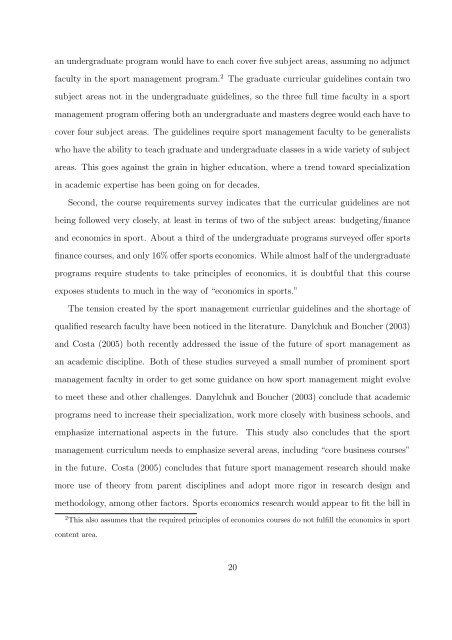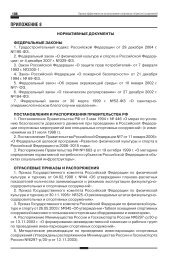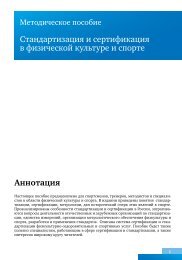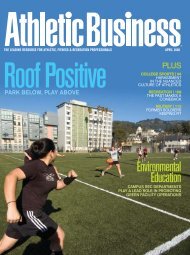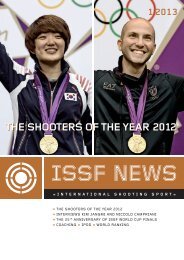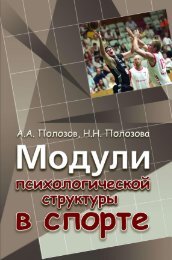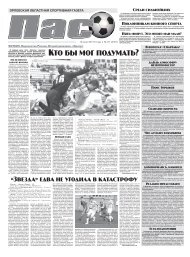The Role of Sports Economics in the Sport Management Curriculum
The Role of Sports Economics in the Sport Management Curriculum
The Role of Sports Economics in the Sport Management Curriculum
Create successful ePaper yourself
Turn your PDF publications into a flip-book with our unique Google optimized e-Paper software.
an undergraduate program would have to each cover five subject areas, assum<strong>in</strong>g no adjunct<br />
faculty <strong>in</strong> <strong>the</strong> sport management program. 2 <strong>The</strong> graduate curricular guidel<strong>in</strong>es conta<strong>in</strong> two<br />
subject areas not <strong>in</strong> <strong>the</strong> undergraduate guidel<strong>in</strong>es, so <strong>the</strong> three full time faculty <strong>in</strong> a sport<br />
management program <strong>of</strong>fer<strong>in</strong>g both an undergraduate and masters degree would each have to<br />
cover four subject areas. <strong>The</strong> guidel<strong>in</strong>es require sport management faculty to be generalists<br />
who have <strong>the</strong> ability to teach graduate and undergraduate classes <strong>in</strong> a wide variety <strong>of</strong> subject<br />
areas. This goes aga<strong>in</strong>st <strong>the</strong> gra<strong>in</strong> <strong>in</strong> higher education, where a trend toward specialization<br />
<strong>in</strong> academic expertise has been go<strong>in</strong>g on for decades.<br />
Second, <strong>the</strong> course requirements survey <strong>in</strong>dicates that <strong>the</strong> curricular guidel<strong>in</strong>es are not<br />
be<strong>in</strong>g followed very closely, at least <strong>in</strong> terms <strong>of</strong> two <strong>of</strong> <strong>the</strong> subject areas: budget<strong>in</strong>g/f<strong>in</strong>ance<br />
and economics <strong>in</strong> sport. About a third <strong>of</strong> <strong>the</strong> undergraduate programs surveyed <strong>of</strong>fer sports<br />
f<strong>in</strong>ance courses, and only 16% <strong>of</strong>fer sports economics. While almost half <strong>of</strong> <strong>the</strong> undergraduate<br />
programs require students to take pr<strong>in</strong>ciples <strong>of</strong> economics, it is doubtful that this course<br />
exposes students to much <strong>in</strong> <strong>the</strong> way <strong>of</strong> “economics <strong>in</strong> sports.”<br />
<strong>The</strong> tension created by <strong>the</strong> sport management curricular guidel<strong>in</strong>es and <strong>the</strong> shortage <strong>of</strong><br />
qualified research faculty have been noticed <strong>in</strong> <strong>the</strong> literature. Danylchuk and Boucher (2003)<br />
and Costa (2005) both recently addressed <strong>the</strong> issue <strong>of</strong> <strong>the</strong> future <strong>of</strong> sport management as<br />
an academic discipl<strong>in</strong>e. Both <strong>of</strong> <strong>the</strong>se studies surveyed a small number <strong>of</strong> prom<strong>in</strong>ent sport<br />
management faculty <strong>in</strong> order to get some guidance on how sport management might evolve<br />
to meet <strong>the</strong>se and o<strong>the</strong>r challenges. Danylchuk and Boucher (2003) conclude that academic<br />
programs need to <strong>in</strong>crease <strong>the</strong>ir specialization, work more closely with bus<strong>in</strong>ess schools, and<br />
emphasize <strong>in</strong>ternational aspects <strong>in</strong> <strong>the</strong> future. This study also concludes that <strong>the</strong> sport<br />
management curriculum needs to emphasize several areas, <strong>in</strong>clud<strong>in</strong>g “core bus<strong>in</strong>ess courses”<br />
<strong>in</strong> <strong>the</strong> future. Costa (2005) concludes that future sport management research should make<br />
more use <strong>of</strong> <strong>the</strong>ory from parent discipl<strong>in</strong>es and adopt more rigor <strong>in</strong> research design and<br />
methodology, among o<strong>the</strong>r factors. <strong><strong>Sport</strong>s</strong> economics research would appear to fit <strong>the</strong> bill <strong>in</strong><br />
2 This also assumes that <strong>the</strong> required pr<strong>in</strong>ciples <strong>of</strong> economics courses do not fulfill <strong>the</strong> economics <strong>in</strong> sport<br />
content area.<br />
20


